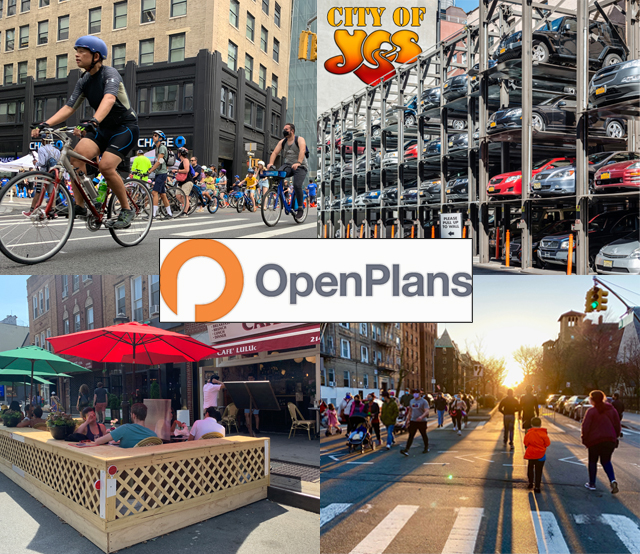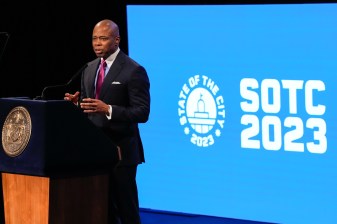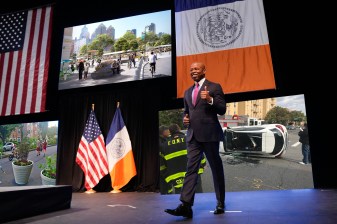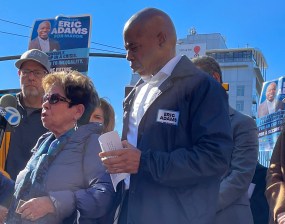What the Livable Streets Movement Wants from Thursday’s State of the City Address


Like Gov. Hochul’s State of the State address in early January, Mayor Adams’s State of the City address on Thursday will set the tone for the coming year — and you can learn a lot about a leader by what he or she chooses to highlight at such a public address.
New York City is at a fascinating crossroads as we emerge from the pandemic with a host of new programs and new ideas for how we can use public space. We must build from what we’ve learned. The recent “New New York” report centered people and placemaking in our city’s future — a good sign that we may be on the right track.
But if we’re going to make each of those 40 commitments a reality, our local leadership must buy in. Everyone — from the mayor himself to local Council members to community boards — must prioritize action that responds to our city today, not to an outdated and inequitable idea of what New York City once was. Marketing campaigns aimed at merely educating dangerous drivers are not enough; we must pursue new policies — and options — that encourage people to get out of their cars altogether.
The tools of the past aren’t sufficient for our future. Here are the things that Mayor Adams must include in his State of the City address if he is serious about a safer, more livable, more people-centered New York:
A focus on livable streets: Adams should be acknowledging — and celebrating — that livable streets are central to achieving his core goals. Open Streets are proven to catalyze economic recovery, safety, and public health. New York City must begin to see open streets, and all efforts toward livability, as a central piece of our future, and commit to them accordingly.
Announce the Director of the Public Realm: The “New New York” report has all but promised that this new appointment will be coming soon. Adams should use this opportunity to explain why this position is important to our future and further commit to better holistic public space management across the city.
Commit to a permanent open restaurants program: Our local officials have dithered for far too long on a final decision for this incredibly popular, commercially beneficial program. 2023 must be the year that New York City commits wholeheartedly to championing a year-round permanent program.
Cheerlead the “City of Yes” Zoning for Affordable Housing: We know housing will be a hot issue in this year’s speech. Any work toward better housing policy must include citywide elimination of parking mandates.
Announce expanding Summer Streets to outer boroughs: This should be a no-brainer. For 14 years, Summer Streets has reclaimed Manhattan streets for over 300,000 New Yorkers. It’s time that people in other boroughs get a chance to enjoy the same fun, enriching space closer to their own homes. Expansion to Brooklyn and Queens already has the support of Borough Presidents Antonio Reynoso and Donovan Richards.
Extol automated enforcement at the curb: Any forward-looking city must begin to employ the wealth of options available for automated enforcement. These new tools are important not just because they catch violators of curb uses but because they change behavior. Consistent curb enforcement sends a message that blocking loading zones, bike lanes, and bus lanes will have immediate consequences. Technology will be much faster and more efficient at inspiring this behavior shift than relying on manual enforcement.
Commit to reducing the city fleet: New York City is implicitly encouraging car use with outdated policies like providing commuter vehicles to some employees and using cars and trucks in parks, where cargo bikes and carts would be sufficient. Agencies should provide free public transit fare for employees rather than cars and parking privileges. And they should commit to eliminating non-emergency light-use city vehicles entirely.
Clearly prioritize public transportation over cars — funding buses and trains over highways: New York City’s public transit is the best in the world and makes the city the lively, anything-is-possible place it is. Leadership should be celebrating that and investing in it above all else. We also must begin to treat newer modes – like bikes and scooters – as important components of our current public transit system.
See how Open Plans is pursuing these solutions, at the city, state, and agency levels, in our 2023 legislative agenda.
Chelsea Dowell is communications director for Open Plans.



